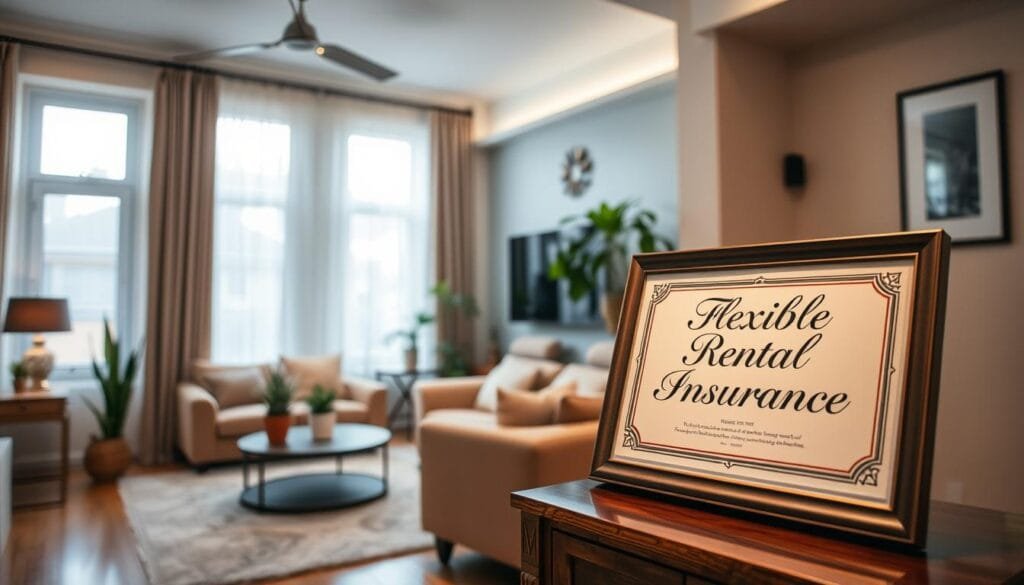לחיות בדירה שכורה נותן לך חופש ונוחות. אך זה מביא סיכונים שאינם חושבים עליהם כל השוכרים. ביטוח שכר הוא חיוני. הוא מגן כלכלית על הדברים שלך אם הם נגנבים, ניזוקים או אבודים. הביטוח הזה מכסה את הרכוש שלך ואת האחריות אם מישהו נפגע במקומך.
בצורה מפתיעה, כ-50% מהשוכרים אינם מכילים ביטוח, כך אומר מכון מידע לביטוח. הם מציבים את עצמם בסיכון כלכלי. לקבלת ביטוח שכר אומר שלא תדאג לאבד כסף מאש במים. לפעמים, הבעלים שלך עשוי לבקש אותו כאשר אתה חותם על החוזה. זה חלק מרכזי בהיות שוכר אחראי.
מסקנות מרכזיות
- ביטוח שכר מגן על ההפסד הכלכלי מגניבה או נזק.
- הוא מספק כיסוי אחריות לתאונות שקורות בבית השכירות שלך.
- כ-50% מהשוכרים אינם מחזיקים בביטוח, מגבירים את הסיכון הכלכלי שלהם.
- רבים מבעלי הנכסים דורשים ביטוח שכר כחלק מהסכם השכירות.
- ביטוח דירה תורם לשקט הנפש הכללי שלך.
הבנת ביטוח דיירים
ביטוח דיירים הוא רשת ביטחון עיקרית עבור אלה שחיים בדירות מקורה. חשוב לדעת מה זה כדי לראות למה זה חשוב. הביטוח הזה מגן על הדברים שלך ומכסה אותך אם מישהו נפגע במקומך.
מהו ביטוח דיירים?
ביטוח דיירים הוא תוכנית ששומרת על השוכנים בבתים שכורים מפני סיכונים. הוא מכסה את הדברים שלך באירועים כמו אש, גניבה או חנזה. בנוסף, יש בו כיסוי אחריות במקרה שמישהו נפגע בבית המקורה שלך.
איך ביטוח דיירים עובד
הבנת איך ביטוח דיירים עובד היא חיונית. הוא פועל כאשר אתה נתקל באובדן מכוסה. אתה מגיש תביעה ואחרי הפרוטה שלך, אתה מקבל עזרה לתיקון או החלפה של הדברים שלך. זה רשת ביטחון לנזק ממזג אוויר, גניבה וסיכונים אחרים.
חברות ביטוח מציעות רמות שונות של פוליסות כדי להתאים אותן לצרכיך. לדעת את הפרטים האלה עוזר לך להפיק את המרב מהכיסוי שלך. חשוב לחשוב על ערך הדברים שלך ועל כל הסיכונים שאתה עומד מולם כדי לבחור את הפוליסה הנכונה.
| סוג כיסוי | תיאור | סיכונים נפוצים שמכוסים |
|---|---|---|
| רכוש אישי | מכסה אובדן או נזק לרכוש אישי | אש, גניבה, נזק כתוצאה מפעולות זדוניות |
| כיסוי אחריות | מגן על האחריות המשפטית במקרה של פציעות | פציעות במקום, דמי משפט |
| הוצאות למגורים נוספות | מכסה עלויות למגורים זמניים אם הדירה אינה מתאימה לשהייה | פינוי כתוצאה מנזק |
היתרונות של ביטוח דיירים
ביטוח דיירים מעניק יתרונות עיקריים שנתרגל להתעלם מהם. היתרונות הללו עוזרים לדיירים לבחור בצורה נכונה בכיסוי. ביטוח דיירים מגן בעיקר על רכוש האישי ומציע כיסוי באחריות.
הגנה פיננסית על רכוש האישי
ביטוח דיירים מספק בטיחות פיננסית עבור פריטים אישיים. אם קורה גניבה, אש או נזק מים, הוא יכול לשם לך חזרה. התמיכה הזו מאפשרת לדיירים להתאושש מהפסדים במהירות.
כיסוי באחריות
כיסוי באחריות הוא חלק מרכזי בביטוח דיירים. הוא מגן נגד תביעות מפגיעות או נזק לרכוש. עם זאת, דיירים יכולים להרגיע, ולדעת שהם מוגנים מבעיות משפטיות יקרות.

ביטוח דיירים עבור רכוש האישי שלך
ביטוח דירה משמש כרשת ביטחון עבור רבים בהגנת רכושם. חשוב לדעת אילו פריטים מכסה הפוליסה שלך. זה יעזור לך להשיג את מירב התועלת מהביטוח שלך.
אילו פריטים אישיים מכסה הביטוח?
ביטוח דירה כולל בדרך כלל מגוון רחב של פריטים בבית שלך. כך כולל:
- רהיטים כגון ספות, מיטות ושולחנות
- מוצרי חשמל כולל טלוויזיות, מחשבים ומכשירים
- בגדים ואביזרים אישיים כמו נעליים ותכשיטים
- ציוד ספורט וחומרי תחביב
- פריטים יקרים כמו אמנות ואוספים
הכיסוי הזה מגן על הדברים שלך מפני נזקים, גניבות ועוד. זה אומר שתוכל לתקן או להחליף את הפריטים שלך כראוי.
הבנת ערך מזומן בפועל לעומת עלות החלפה
חשוב להבין מונחים כמו ערך מזומן בפועל ו-עלות החלפה כאשר בוחרים ביטוח. אלו קובעים כמה כסף תקבל אם תגיש תביעה:
| מונח | תיאור | השפעה על דרישות |
|---|---|---|
| ערך מזומן בפועל | מתחשב בשיעור ההשקעה. אתה מקבל את ערך הפריט בזמן האובדן. | אומר שיתכן שתקבל פחות כסף בגלל השיעור ההשקעה. |
| עלות החלפה | משלמת על החלפת הפריט כחדש, פחות השיעור ההשקעה. | מציע תמיכה כלכלית טובה יותר להחלפת פריטים. |

גורמים המשפיעים על תעריפי ביטוח שוכרים
ידע על הדברים שמשפיעים על תעריפי ביטוח השוכרים עוזר בבחירות חכמות. רבים מהם חיוניים בקביעת התעריפים הללו. על ידי הבנתם, שוכרים יכולים למצוא דרכים להפחתת עלויותיהם.
מיקום ותכונות אבטחה
אזור המגורים שלך משפיע מאוד על תעריפי הביטוח. אם השכונה שלך מושפעת מפשיעה גבוהה, סביר שתשלם יותר מחיר מאחר שיש סיכוי גדול יותר לגניבה או נזק. מאידך, אזורים בטוחים יותר נוטים להכיל עלויות ביטוח נמוכות יותר. הוספת תכונות אבטחה למקום שלך יכולה גם להוריד את חשבונות הביטוח שלך. כמה דוגמאות כוללות:
- מערכות אזעזור
- מנעולים תואמים על הדלתות
- תאורה המופעלת על ידי תנועה
חברות ביטוח רואות בשלבים אלה להפחתת הסיכון. לכן, הן לעתים תציענה פרמיות נמוכות יותר עבור בתים מאובטחים יותר.
היסטוריית דרישותיך וציון האשראי שלך
הדרישות הקודמות שלך וציון האשראי שלך חשובים גם. שוכרים שהגישו הרבה דרישות עשויים לראות את התעריפים שלהם עולים. חברות ביטוח חושבות שהם יותר סבירים להגיש דרישות בעתיד. אך, רשומת דרישות נקייה עשויה לעזור לך לקבל ביטוח זול יותר. בנוסף, ציון אשראי טוב מציין לחברות ביטוח שאתה אדם אחראי. זה עשוי להוביל לתעריפים טובים יותר. חברות מביטוח מביטות בשני הגורמים הללו כדי להחליט על רמת הסיכון שלך ולתת מחיר לפוליסתך.
| גורם | השפעה על התעריפים |
|---|---|
| מיקום | תעריפים גבוהים באזורים עם פשיעה גבוהה, תעריפים נמוכים בשכונות בטוחות |
| תכונות אבטחה | הנחות עבור מערכות אזעקה ואמצעי אבטחה נוספים |
| היסטוריית דרישות | פרמיות גבוהות עבור דרישות תקופתיות; פרמיות נמוכות עבור דרישות מעטות או בלי דרישות |
| ציון אשראי | פרמיות נמוכות עבור אשראי טוב; פרופילים פחות בטוחים עשויים לגרום לתעריפים גבוהים יותר |
איך לבחור את מדיניות הביטוח לשוכרים הנכונה
כאשר אתה בוחר מדיניות ביטוח לשוכרים, חשוב לחשוב על מה שאתה צריך. התחל בלדעת את ערך הדברים שלך. השלב הזה חשוב לוודא שהציוד האלקטרוני והרהיטים שלך מוגנים. ערך הדברים שבבעלותך משחק תפקיד חשוב בבחירת ביטוח.
הערכת צרכי הכיסוי שלך
לדעת את ערך הפריטים שלך חיוני לרמת הכיסוי הנכונה. עליך לרשום את הרכוש שלך עם פרטים וערכם. רשימה זו עוזרת לראות איפה ייתכן שתצטרך יותר כיסוי. חשוב לדעת אילו פריטים מכסה מדיניות שלך.
השוואת תכונות ומחירי מדיניות
השוואת תוכניות ביטוח מראה לך את ההבדלים בין מה שהן מכסות והעלויות. תבחן את המחירים, אך גם בדוק את המוניטין של החברה ואת ביקורות הלקוחות. חשוב לחשוב על תוספות כמו גניבת זהות או הגנה מפני נזק מים גם. כל אלו יכולים להיות מאוד שימושיים.
השתמש בכלים באינטרנט או שוחח עם סוכן כדי לקבל ייעוץ המותאם אישית לך. לבחירה חכמה יש פיקוח טוב יותר שגם מתאים לתקציב שלך.
| ספק ביטוח | דמי פרמיום חודשיים | גבול כיסוי | עצמאות | תכונות נוספות |
|---|---|---|---|---|
| חוות המדינה | $15 | $30,000 | $500 | הגנת גניבת זהות |
| כל המדינה | $12 | $25,000 | $250 | כיסוי עלות החלפה |
| Liberty Mutual | $18 | $35,000 | $1,000 | כיסוי אובדן שימוש |

מסקנה
ביטוח שוכרים הוא חובה לכל מי שגר בדירה שהוא שוכר. הוא מגן על הרכוש שלך מפני גניבה או נזק. גם הוא נותן לך כיסוי אחריות, שיעזור אם תתבעו אי פעם על תאונות במקום שלך.
חשוב לחשוב על מה שאתה זקוק לו ועל הסיכונים שעשויים להתרחש. זה יעזור לך לבחור את הביטוח לשוכרים הנכון עבורך. לקבלת פוליסת ביטוח לשוכרים זה יותר מפשוט לשלם על כך. זה עניין של שמירה על שקט נפש, הגנה על דבריך וטיפול באירועים בלתי צפויים בקלות.
לקבלת ביטוח לשוכרים זה אומר שאתה דואג לביטחונך הפיננסי ולרווחתך. עם יותר אנשים ששוכרים עכשיו מאי פעם, בחירת כיסוי ביטוח הנכון היא קריטית.





















